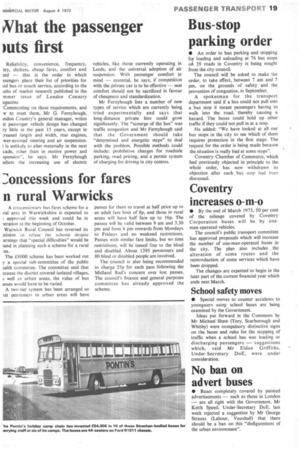Nhat the passenger nits first
Page 21

If you've noticed an error in this article please click here to report it so we can fix it.
Reliability, convenience, frequency, ety, shelters, cheap fares, comfort and ted — that is the order in which ssengers place their list of priorities for od bus or coach service, according to the ailts of market research published in the mmer issue of London Country agazine.
Commenting on these requirements, and w to meet them, Mr G. Fernyhough, indon Country's general manager, writes at passenger vehicle design has changed ry little in the past 15 years, except in reased length and width, rear engines, wer-assisted steering and air suspension. t is unlikely to alter materially in the next cade, other than in motive power and spension", he says. Mr Fernyhough edicts the increasing use of electric vehicles, like those currently operating in Leeds, and the universal adoption of air suspension. With passenger comfort in mind — essential, he says, if competition with the private car is to be effective — seat comfort should not be sacrificed in favour of cheapness and standardization.
Mr Fernyhough lists a number of new types of service which are currently being tried experimentally and says that long-distance private hire could grow significantly. The "scourge of the bus" was traffic congestion and Mr Fernyhough said that the Government should take "determined and energetic steps" to deal with the problem. Possible methods could include: prohibitive charges for roadside parking, road pricing, and a permit system of charging for driving in city centres.








































































































